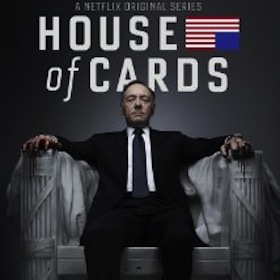‘House of Cards’ Season 1 Signals A Coup For Netflix

4.5/5
House of Cards, the Netflix original series starring Kevin Spacey and Robin Wright, presents a political drama that sketches a sordid portrait of the Capitol’s seedy underbelly, guided by the first lines of its lead character: “There are two kinds of pain. The sort of pain that makes you strong, or useless pain, the kind that’s only suffering. I have no patience for useless things. Moments like this require someone who will act, do the unpleasant thing, the necessary thing.”
Netflix’s ambition to start creating original content was certainly seen as being potentially risky, and recreating a British show was a tall task in and of itself. Yet, the company benefited from the cheap and viral advertisement provided by everyone weighing in on the streaming service’s endeavor. And, despite the chances of garnering criticism from people who will forever claim to prefer the British version (see: The Office), there are likely to be just as many who get sucked into the new fare. All 13 episodes of season one of House of Cards were released two weeks ago today, and seemed to prove that Netflix might just have the mettle to revolutionize television programming – and for the better.
House of Cards doesn’t shy away from the dirtiness or the inhumanity that can be a part of politics, while still managing to ground the more theatrical in substance. The political scenario that frames the whole narrative revolves around the Congressional Whip of South Carolina, Francis Underwood (Spacey), getting snubbed for the Secretary of State position. In tandem with his wife, Claire Underwood (Wright), the congressman immediately takes to plotting his revenge, in which he soon embroils a young and ambitious journalist at the Washington Herald, Zoe Barnes (Kate Mara). Through her, he leaks sensitive information that enables him to puppeteer the politics of his choosing. What makes this work in House of Cards is that, as the title suggests, every calculated and delicate move comes with a risk – making each minute error result in the crumbling of a plan, only to have Underwood pick the effort back up again. This idea is no more clearly shown than in Underwood’s masterful game with the young Philadelphia Congressman fraught with vices, Peter Russo, played spot-on by Corey Stoll. Underwood manages to manipulate him into complicity and hijacks a spot for him in the Pennsylvanian gubernatorial race, only to see his house come crashing down when both Russo’s sobriety and loyalty can no longer be trusted. Not one to resign, Underwood reconfigures the plan and ultimately achieves his goal – perhaps even faster than he had dreamed.
Spacey and Penn as the leading couple in Netflix’s original series look destined to be contenders for the Golden Globes next year. Their portrayal of this dynamic Washington couple is winning for so many reasons, yet perhaps most for the depiction of the genuine chemistry that can arise from a mutual aspiration to power. It’s a relationship that grows in authenticity as the season progresses, which is not to say that it isn’t bizarre, but that for them it makes sense. Claire is hard on Francis, expecting him to perpetually be the exactor of his will, yet she expects no less of herself. And while there’s a pervasive sense of the respect and love that they have for one another, it’s learned that they have an understanding that allows them to sleep with people outside the marriage – a hall pass that they both take advantage of as Francis sleeps with reporter Zoe, and Claire renews an affair with a free-spirited photographer she commissions for her environmental organization.
Although Barnes’ rise to fame comes off as premature, no doubt partially due to how young Mara looks on screen, it serves to make a clear argument for a new age of journalism. Barnes had been trying indefatigably to persuade her higher-ups that the print publication needed to do more to engage an audience – by blogging, tweeting, etc. The conflict resolves itself when she starts to get courted by other publications after giving a television interview, from which she chooses Slugline – described as the new Politico. It’s once she’s at Slugline, cranking out stories on the Internet as soon as she can piece them together, that she begins to unravel the sinister business she aided when publishing at the behest of her source, Francis Underwood. Her obliviousness manages not to seem contrived in the series, because the topics of legislation and scandal served to her by the Whip were not the sensational types one comes to expect in television. There’s education reform, the saving of a shipyard and a damning article in a college paper once helmed by the senator nominated for Secretary of State. Actually, the least believable scene in all 13 episodes is when Underwood squares off against the leading education lobbyist on national TV, and spirals into a few minutes of Elmer Fudd-like incoherency. That just wouldn’t happen.
Netflix should be proud of what they managed to put out with their first stab at original programming, while breaking tradition to cater to the new generation of binge watchers. Throughout the series, there’s an underlying consciousness of being modern – from Zoe’s laments, to Underwood blowing off steam playing a Call of Duty-like game with headphones, to the experimental bit of direction that displays texting conversations with text bubbles that pop up on the screen. Admittedly, it seemed odd at first, but when the alternatives are considered (the camera peering over the texted or recipient’s shoulder, having the texts awkwardly read aloud) it seems like something that could grow on a viewer – much like the new viewing format.
House of Cards‘ first season had its fair share of problematic idiosyncrasies, including Francis’ turns breaking the fourth wall to expostulate on his sinister thoughts and actions at times when it’s all abundantly clear. It also suffers from the superficially cosmetic (yet, distracting) problem of some bad dye jobs for the leading men – especially the attempt to make President Walker (Michael Gill), a silver fox. It looked like it came from a can of spray paint, but if I’m honest the character of the President could probably be done away with altogether. Transcending whatever slight shortcomings it might have, House of Cards shows promise of capably rectifying them as the show progresses. It’s the latest in a long and enduring string of shows set in the nation’s Capitol, but it manages to not seem in any way tired. It’s definitely not the morally righteous West Wing, and it’s far from the evening soap opera that’s ABC’s Scandal. House of Cards isn’t perfect, but it’s close enough that it’s easy to wish the second season was already in your Netflix queue.
RELATED ARTICLES
Get the most-revealing celebrity conversations with the uInterview podcast!






Leave a comment